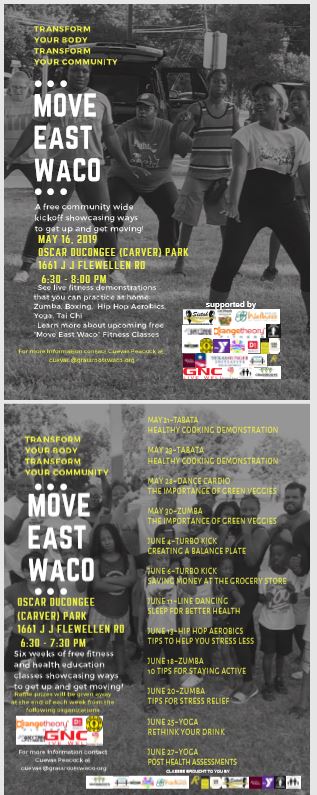By Lindsey Breunig
In 2020, the Better Living for Texans posts will continue, and we are excited to announce that monthly posts will start focusing on a seasonal fruit or vegetable. Material shared will include the nutritional value/benefits, how to select and store, cook and use, and other fun facts regarding the chosen fruit or vegetable! Have a request? Feel free to share and let us know!
Per USDA dietary guidelines it is recommended we consume 1 – 2 Cups of fruit daily. Fruit may be fresh, canned, frozen, or dried, and may be whole, cut-up, or pureed, it all counts! In general 1 cup of fruit or 100% fruit juice, or ½ cup of dried fruit can be considered as 1 cup from the Fruit Group. Like vegetables, we want a variety of color on our plate and in our diet, one way to vary your plate is by choosing fruits that are in season! As we transition into the winter months one may traditionally label winter colors as “darker” and “warmer,” but today’s highlighted fruit is not the case! Winter season is “when you’ll find the bright greens, eye-popping yellows, and oh-so-lively oranges.” Let’s bring out the bright colors and talk about citrus fruits!
Citrus includes but is not limited to oranges. Other types of citrus fruits are lemons, limes, mandarins (tangerines), grapefruit, and kumquats. (source) When shopping for citrus look for a peel that is smooth in texture versus a thicker bumpy peel. Avoid citrus that has soft or mushy spots. Citrus fruits come from a tree and do not continue to ripen once they are picked. For juicy citrus choose a heavier a fruit, and for good flavor take a whiff and know a sweet fragrance often means good flavor. For continued best quality of the fruit, store in the refrigerator’s crisping drawer. Citrus will keep in the fridge for several weeks compared to a few days to a week if stored on the counter. (Source). Citrus fruits are high in vitamin C and folate. Vitamin C is important for growth and repair of all body tissues, helps heal cuts and wounds, and keeps teeth and gums healthy. When it comes to citrus fruits there are a range of options available.

Orange juice is a common staple for many, but one must use caution to ensure it is not the only source of fruit. Juice should make up half or less of total recommended fruit or vegetable intake. Whole or cut-up fruit will provide dietary fiber and reduce sugar intake when compared to juice. Think about how many oranges it takes to make a cup of juice – about 3 oranges! Though naturally occurring, the sugar from one orange compared to a cup of juice adds up quick! If you don’t mind the flavor, try cutting your juice with water to reduce sugar. Additionally, when selecting juice, read the nutritional label on the back to verify there are 0g of Added Sugars.
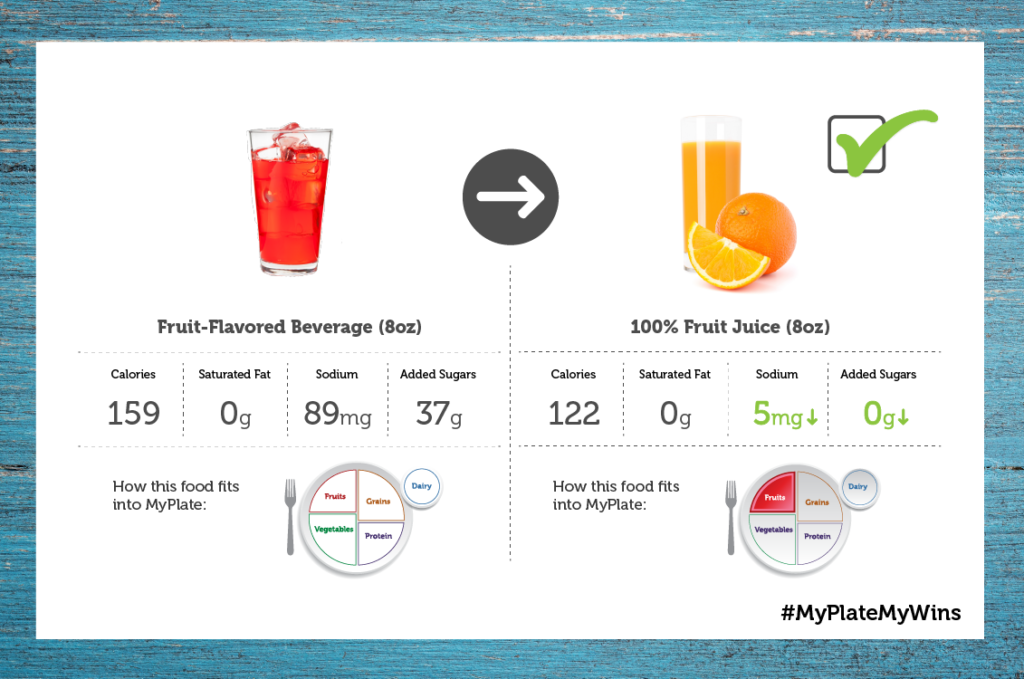
Precut fruit can be convenient and a great snack option, but often has a higher price tag. Luckily during citrus season mandarin (tangerine) oranges are often on sale and make for a great snack. Trying to find the best deal? Always compare the unit price to see the best deal. See the example below, what would you choose?
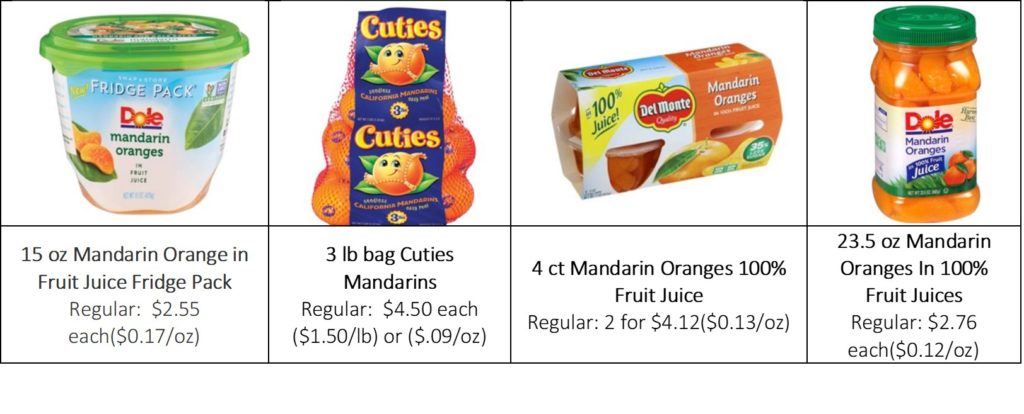
Inspired to add more citrus into your winter cooking? Check out some of these great recipes!
- Orange and Ginger Salmon
- Grapefruit Salad and Vinaigrette
- Asparagus, Mandarin Orange, Chicken and Rice
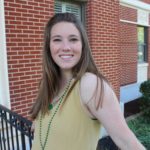
Lindsey Breunig is a graduate of Baylor University and currently works as the Better Living for Texans Educator for the Texas A&M AgriLife Extension Service. She is originally from Grapevine, TX and now calls Waco home. Here in Waco she loves to venture out to Cameron Park, visit the local Farmers Market, and try out the awesome eateries in Waco. If you see her and hear a loud bark, that’s her pup Lucy just saying hello.
USDA is an equal opportunity provider and employer. This material was funded by USDA’s Supplemental Nutrition Assistance Program — SNAP. To learn more about the Supplemental Nutrition Assistance Program (SNAP) or to apply for benefits, visit www.yourtexasbenefits.com
The Act Locally Waco blog publishes posts with a connection to these aspirations for Waco. If you are interested in writing for the Act Locally Waco Blog, please email [email protected] for more information.
Top 10 “Most Opened” Blog Posts of 2019: # 5
By Ellie Triplett
If you avoid gluten for any reason, eating out can be a challenge. If you’ve been doing it for any amount of time, you’re probably an old pro at the basics of avoidance when it comes to regular menus. But what about when you want something as classic as a cheeseburger? Where do you go for your macaroni and cheese cravings? Where can you find gluten-free pancakes? Or, the golden chalice of gluten-free eating, where can you go for pastries? Never fear, my friends, you are in luck. I am here to tell you that you are living in a town with a growing culinary culture, with restaurants that provide an impressive array of allergen friendly dining options. What follows is a very basic, non-comprehensive list of where to find your fill of sans-gluten treats in good ol’ Wacotown.
It seems logical to start with breakfast. If you are looking for pancakes, Café Cappuccino (with three locations at 100 N. 6th St., 1101 Richland Dr., and 903 N. Hewitt Dr.) is known for its amazing, plate sized pancakes, and now they come in gluten-free! I have personally ordered and enjoyed them.
Uptown features wonderful vegan and gluten- free waffles at Luna Juice Bar (1516 Austin Ave.). In carrot, matcha, and strawberry, the waffles are made with oat flour, gluten-free flour, or coconut flour and topped with coconut whipped cream, and are DELICIOUS. Pair them with a smoothie, or a cold pressed juice and you’ve got a perfect breakfast. Luna Juice also has a full menu of delicious salads, soups, and wraps, if you need a quick lunch later in the day.
Down the street at Harvest on 25th (112 N. 25th St.) you can continue your breakfasting or slide right into brunch with gluten free muffins, pancakes, or avocado toast. They offer ways to make their entire menu gluten-free and also offer gluten- free pizzas.
Since we’ve moved on to lunch, and specifically pizza, it is worth mentioning that Poppa Rollos (a long time local favorite at 703 N. Valley Mills) offers a good gluten-free version, and both Slow Rise Slice House (7608 Woodway Dr.), and 900 Degrees Pizzeria (315 S. University Parks) have cauliflower crusts which are keto friendly as well as being gluten-free.
If you’re craving a hamburger, look no further than Tom’s Burgers (6818 Sanger Ave.) It is a mom and pop burger joint that has just recently been brought to my attention for their gluten-free buns.
A newer option with gluten-free buns and bread is Revival East Side Eatery (704 Elm Ave.). They have a full menu, including soups and salads, so you’re sure to find something for everyone.
If you’re looking for the kings of comfort food (in my opinion), macaroni and cheese and grilled cheese sandwiches, look no further than The Mac House (3428 Franklin Ave.). Their artisan sandwiches and macaroni creations are amazing, and worth every penny and every minute you’ll spend waiting (it’s a bit, y’all, but worth it!).
Which leads me to my favorite way to splurge on gluten-free food; the pastries. Fabled Bookshop downtown (215 S. 4th St.) has gluten free lemon poppy seed cake as a part of their newly opened café, alongside literary themed drinks and other snacks. However, Baked Bliss (1114 N. 15th St.) is truly the sweet spot for sweets (see what I did there?) with cinnamon rolls, cranberry orange scones, brownies, chocolate chip cookies, blueberry muffins, and bacon cheddar scones (if you’re feeling the savory side of things) all offered gluten-free daily. You can pre order their gluten-free bread, which they bake on Wednesdays in a completely gluten-free kitchen, on Tuesday mornings. They also have gluten-free cakes, cupcakes, lemon shortbread, and pecan shortbread cookies, all of which can be made ahead of time for special events.
Phew! It’s a lot! A couple of things to note as we wrap up. Firstly, I am not a food blogger, or really any type of blogger. In many of these cases, I have eaten and enjoyed the food, but this is not true across the board. As a result, I did not attempt to describe in too much detail the experience of eating the food, so as to be fair. Secondly, this is by no means a comprehensive list. If your restaurant, or your favorite restaurant was left off the list, it is in no way meant as a slight. I polled my friends, asked for help, and sent out a few cursory messages asking for clarification on menu items. The result is this post. If I made a grievous error, leave us a comment! Share your knowledge! Thirdly, it is important to keep in mind that there are no certified gluten-free kitchens on this list. Most things will experience some level of cross contamination, and you are, as always, advised to check with your servers and express your level of allergy, and make an informed decision for yourself.
Happy (and safe!) eating, friends!
A couple of other resources…
- Gluten Free Waco website and Facebook page.
- “Find me Gluten Free” app

Ellie Triplett is a book lover, weaver, former bee keeper, and enneagram four. She lives and works (and eats) in Waco alongside her spouse and their three children.
The Act Locally Waco blog publishes posts with a connection to these aspirations for Waco. If you are interested in writing for the Act Locally Waco Blog, please email [email protected] for more information.
By Carlos Hinojosa
Centering Pregnancy is a fairly new concept that seeks to take prenatal care out of the exam room and into a comfortable and communal setting. It blends regular prenatal visits together with support groups of expecting mothers with similar due dates. Expectant mothers meet for their monthly check-ups, where physicians and nurses facilitate sessions and answer questions that the mothers and their partners have about different aspects of pregnancy. The goals of Centering Pregnancy are to increase the amount of time providers can spend with their patients, improve birth outcomes, help patients build a community of support, and impart a level of knowledge to the patients so they can best care for themselves.
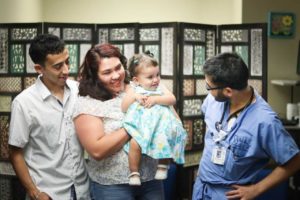
Karla, one of Family Health Center’s patients, recently went through the program herself. Karla has been a patient of Family Health Center since she was born. Her care at FHC actually goes back even further. Her mother was an FHC patient and received her prenatal care here as well, but didn’t experience anything quite like Centering Pregnancy.
When Karla learned she was pregnant, she and her husband were very excited – and a little nervous. There was so much to learn, and neither Karla nor Juan knew quite what to expect. Karla’s doctor talked to her about Family Health Center’s Centering Pregnancy program, and Karla’s mother encouraged her to go. Karla was glad she did. “It was an open and fun way to learn about what was going on inside of me.”
Each meeting, participants gathered in the Centering room at FHC, and one by one, mothers-to -be stepped back into a private area to have their vitals checked and measurements taken to track their progress. After everyone had seen the doctors, the class sessions began. Resources books were issued, and classes featured different activities corresponding to what was happening at that stage of pregnancy. Classes also allowed ample time for questions. “I always had questions, but Juan had even more questions than I did,” Karla said. “You could be sure that if you had a question and were afraid to ask, someone else would ask it.”
The group sessions used the activities to help foster conversation, and those conversations helped everyone get to know each other. Members of each class are encouraged to keep in contact with one another after the classes were over, and Karla has maintained a friendship with one of the members of her group. “It’s nice to know other people who are going through the same things I am, and it helps to be able to talk to someone else.”

When the time came for Karla to deliver, she felt prepared and confident. She didn’t feel overly nervous, and she thanks the team at FHC for preparing her so well. “Centering Pregnancy taught me all of the things I needed to know before my daughter arrived.”
Centering Pregnancy is just another tool Family Health Center is using to improve the health of our community and make a difference for the families we serve. When asked her thoughts on the program as a whole, Karla said, “It was so great that I tell all my friends who are pregnant to go! The next time I have a baby, I plan to go again.”

Carlos Hinojosa serves as Development Director for Family Health Center in Waco. He holds a bachelor’s and master’s degree from University of Mary Hardin-Baylor and has been living in Waco for 18 years. When not at work, Carlos loves to spend time with his wife and two sons taking walks, making up silly games, and perfecting the art of dad jokes.
The Act Locally Waco blog publishes posts with a connection to these aspirations for Waco. If you are interested in writing for the Act Locally Waco Blog, please email [email protected] for more information.
By Rae Jefferson
May is National Mental Health Month, which means there’s no better time to talk about the way mental health is approached by our community. In 2018, Family Health Center (FHC) provided more than $2.2 million in behavioral health services to patients in McLennan and Bell counties. It’s important to note that majority of the patients at FHC qualify as low-income and receive services through Medicaid, Medicare, or out-of-pocket payments. We strive to provide full-scope, compassionate care in the form of medical, dental, and behavioral health services.
Although participation in our behavioral health services is increasing each year as patients learn about our programs and their own mental and emotional needs, it is still one of the lesser-utilized programs at FHC. There are a number of reasons for this, including the fact that not every patient needs behavioral health services. But FHC is also aware that, in our quest to offer high-quality behavioral health care to primarily low-income populations in Waco, we’re up against challenges like stigma, financial limitations, and patients who don’t know how to identify their own mental and emotional needs.
The National Alliance on Mental Illness reports one in five American adults will experience mental illness in a given year. The definition of mental illness is sprawling and ranges from mild cases of depression or anxiety to debilitating battles with post-traumatic stress disorder or schizophrenia. Despite the prevalence of mental illness, studies show that individuals from low-income households, communities of color, or religious environments are less likely to seek medical care for mental health concerns. Furthermore, people of color are at higher risk of mental and emotional distress, with African Americans alone being 20 percent more likely to experience major depression, posttraumatic stress disorder, and suicide. The majority of FHC patients fall into one or more of these categories, often making it a challenge to treat patients who feel they can’t seek help.
FHC takes several approaches to providing accessible behavioral healthcare. We accept patients with and without insurance and can charge on an income-based sliding scale. Of all the barriers to mental health care, we strive to make finances one of the easiest to conquer.
Integrated Behavioral Health (IBH) is FHC’s way of practicing healthcare that allows patients attending a regular doctor’s appointment to see a behavioral health specialist, called an Integrated Health Manager (IHM), in the same visit. These Licensed Clinical Social Workers are on-call to provide mental and emotional support to patients while also determining diagnoses and treatment recommendations to the physician. This process eliminates the need for making follow-up diagnostic appointments or delaying treatment for the patient.
FHC provides traditional counseling through our Family Counseling and Children’s Services Program. We also organize support groups for patients who are pregnant, nursing, or fostering a child. Although these groups are not immediately related to traditional behavioral health services, they often provide emotional support in a group setting that facilitates community-building and leads to a healthier emotional life.
Although we’re already working hard to address mental health needs among low-income Wacoans, we’re always looking for ways to improve these efforts by expanding our programs and partnerships. This summer, the behavioral health team is launching a program in which patients can receive counseling services via in-home visits. This will help address patients’ transportations issues and allow them to explore mental health concerns in a familiar environment.
FHC is one of many organizations in town stepping up to the challenge of providing mental health services to low-income individuals in Waco. We hope our work and the efforts of others can push the needle in such a way that stigma and barriers, both real and perceived, can begin to fall away.

Rae Jefferson is a creative, Netflix binger, and marketing professional, in that order. Originally from Houston, she stuck around Waco after graduating from Baylor University with a B.A. in Journalism, PR, & New Media and a minor in Film & Digital Media. Now she’s the Communications Director at Family Health Center, where she gets to spend each day serving Waco. When she’s not working, find her at home snuggled up with her dog-daughter, Charlie, watching “The Office” for the hundredth time.
The Act Locally Waco blog publishes posts with a connection to these aspirations for Waco. If you are interested in writing for the Act Locally Waco Blog, please email a[email protected]for more information.
By Khristian Howard
If you have been around Waco for a while, you may recall “Move East Waco,” the fitness series that got East Waco up and active two summers ago. We are thrilled to announce that exciting six-week campaign for health education, fitness, and community will be back this summer to continue the impact it began in 2017. Packed with incentives, fun, and most importantly, FREE workout sessions, “Move East Waco 2019” will give you the motivation you need to begin or continue your fitness journey. This year’s series will begin on May 16th at 6:30 p.m. at Oscar DuCongé Park (1504 J.J. Flewellen) and will feature some new and familiar faces to give previews of the workouts and health lectures that will follow in the subsequent six weeks.
Success During Summer ’17 & Hopes for this Year
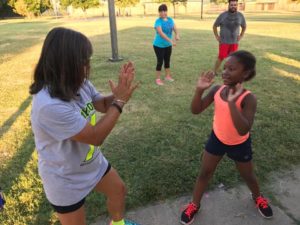
Move East Waco had its debut in the summer of 2017, and immediately proved to be a hit within the community. Cuevas Peacock, community organizer and co-creator of Move East Waco, shared that in 2017 they saw over 100 people attend the kickoff, and [an] average 15 people at the various workouts. This year, Cuevas and the team hope to double the participation numbers, and to implement some new tracking measures that will provide a more comprehensive report of the program’s impact. Cuevas has garnered support from several East Waco community members, many of whom were key players in the success of Move East Waco ’17. These team members include, Tara Briscoe, Victoria Calhoun, Vivian Vonner, Ashley Royal, Sandra Dorsey-Butler, and Van Davis, to name a few. Some of the main organizations represented are Grassroots Community Development, Live Well Waco, Baylor Health & Wellness, and more.
To ensure that the goal of doubling participation is met, the team has secured various incentive donations from places like, Gold’s Gym, Refit Waco, Orange Theory, Jamba Juice, Da Shack Farmer’s Market, and more. Additionally, participants can expect a wide variety of workouts and demonstrations ranging from Zumba, line dance, and hip-hop aerobics to cooking demos, healthy food budgeting classes, and stress relief exercises.
As mentioned above, this summer will mark the second installment of Move East Waco. With the help of health and fitness instructors and local businesses providing services and incentives, the program proved to be a huge success in its first installment. Still, you may be wondering, why do a health and fitness series…and why in East Waco? Cuevas Peacock gave us a glimpse into the motivation behind Move East Waco. He shared some troubling statistics about health in East Waco.
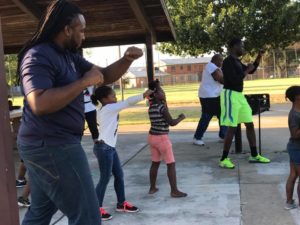
He stated, “Throughout our nation, 12% of residents report being in poor health, in Waco the number rises to 13.2%; however, in East Waco, the number grows even more to 18%. Nationally, 29% of residents are obese, but in East Waco, the number grows to a staggering 45%.” Move East Waco is a solution that Cuevas believes will be a significant factor in decreasing these numbers. “It is our belief that by increasing the amount of physical activity among the residents of East Waco we can begin to lower the high obesity rate and improve the community’s overall health.” Ultimately, Cuevas summarized the goals of the program as a way to “[demonstrate] various ways for our community to get up and get moving, along with providing access to vendors that could address various health issues…[along] with the hope to Move East Waco towards adopting a healthier lifestyle.”
We Want to See You There!
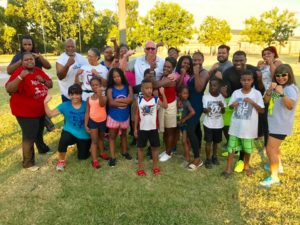
This year’s kickoff event will begin at 6:30 p.m. on Thursday, May 16th, at Oscar DuCongé Park Park in East Waco (1504 J.J. Flewellen), next door to G. W. Carver Middle School. There you will be able to learn easy fitness practices that can be practiced at home. Additionally, this kickoff will give you a preview of each instructor who will be heading up classes throughout the rest of the program. Classes will be held on Tuesdays and Thursdays at 6:30 p.m. from May 21st to June 27th. Do not hesitate to take advantage of free access to health and fitness materials provided by local professionals – and access to great giveaways that can assist you in living a healthier, fuller lifestyle. Join us as we “Move East Waco” closer to maximum wellbeing!
Click here for “Move East Waco 2019 Schedule

Khristian Howard is an Atlanta native and a recent graduate of Georgia State University where she earned a Bachelor’s Degree in Social Work. She has a passion for empowering communities through service, and seeks to connect advocacy to creativity. Currently, she is serving as the AmeriCorps VISTA for Texas Hunger Initiative Waco, where her work focuses on fostering collective impact to improve health and eating habits in East Waco. When she is not working, you may find her sharpening her culinary skills or exploring new poetic and artistic pathways.
The Act Locally Waco blog publishes posts with a connection to these aspirations for Waco. If you are interested in writing for the Act Locally Waco Blog, please email [email protected] for more information.
By Glenn Robinson
When you think of patient care, doctors and nurses are usually at the forefront of everyone’s mind. However, hospitals are increasingly utilizing supplemental programs in addition to the excellent care provided by their clinical staff to fulfill their mission of caring for “the whole patient.”
This month, we take a look at three lesser-known roles in health care that are just as vital to the patient experience and road to recovery as that of a physician or nurse.
Patient Navigators
If you’re going on a long journey to somewhere you’ve never been before, the best bet to get to your destination is being aided by navigation. The care process for a terminal disease or chronic illness is often described as a journey – physical, emotional, and spiritual – so one of the ways many health systems are making the road to survivorship easier is by offering patient navigation.
A patient navigator is a partner for patients and families from the time of the initial diagnosis and throughout their journey – wherever that may lead. A patient navigator strives to help patients make decisions and find their way through the complexities of the healthcare system so they can focus on recovery.
Navigators connect patients with resources and information to help them better understand their diagnosis and treatment options. They can also help remove barriers, whether they be financial or practical – like transportation to and from appointments.
Additionally, patient navigators serve as personal advocates to help ensure patients are receiving high quality care and have all the answers they need… even if it means challenging the status quo.
Another critical job of a patient navigator is to provide emotional support. Patients sometimes have a hard time expressing their fears and sadness even to their closest loved ones, so a navigator can be that listening ear.
On the road to survivorship, to some patients, the help and support navigators provide may be as important as the caregivers delivering the treatment.
Community Health Workers
Community health workers have emerged as an effective strategy in engaging patients and caregivers in lowering costs for healthcare’s “frequent flyers” – patients who often visit emergency rooms and fill hospital beds.
Community health workers have been part of healthcare worldwide for decades. They generally are not doctors or nurses, and often are recruited directly from the communities they serve. Their purpose is to help individuals navigate the healthcare system, manage chronic illnesses more effectively, and access preventive care.
They also help patients tackle important health-related issues such as food and housing insecurity. Community health workers often serve people in impoverished communities who lack access to quality healthcare, lack the means to pay for healthcare, do not speak English fluently, or have cultural beliefs, values, and behaviors that differ from those the traditional U.S. healthcare system is geared towards.
New research suggests these workers may contribute to fewer days in the hospital for some patients. Patients with help from a community health worker were nearly twice as likely to report receiving high-quality primary care and spent fewer total days in the hospital.
Recognizing the value of these individuals, the Texas Department of State Health Services has a community health worker certification program to develop these dedicated individuals’ communication and navigation skills, as well as their knowledge of available community resources.
Though typically not clinicians or administrators, community health workers are playing an increasingly important role in healthcare quality and cost.
Volunteers
Often known as candy stripers in the past, today, hospital volunteers are a diverse group of men and women of all ages who perform a wide range of functions.
Volunteers are vital members of the community and the hospital team who share their time, talents, and passion for helping others, while either directly or indirectly making a difference in the lives of patients and families.
There are many different roles for hospital volunteers. Some oversee the hospital information desk and provide directions and a warm smile to patients and visitors. Others deliver flowers and packages to patients, run the gift shop, or perform a full range of back-office administrative tasks so other staff can keep their focus narrowed in on patient needs.
Many hospitals also have special volunteer programs. For example, pairing former patients who have successfully overcome a serious condition, such as heart disease or cancer, with patients who are now on that same journey. Or even more innovative programs like volunteers who share their musical or artistic talents with patients as a form of therapy. There are even animal-assisted therapy volunteer programs at some hospitals in which four-legged volunteers join their two-legged team members to bring smiles to patients’ faces.
Programs like these have been shown to raise the spirits of patients and can contribute to a better patient experience. But volunteers also benefit. Research has demonstrated that volunteers are often healthier, happier people.
Hospital volunteers truly create a win-win-win situation – for themselves, for patients, and for the hospital.
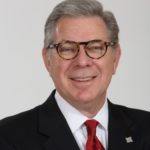
Glenn Robinson is the President of Baylor Scott & White Medical Center – Hillcrest. He has over 30 years of experience in hospital and health care management, and currently serves on several Boards associated with the Texas Hospital Association and the American Hospital Association. In addition, Glenn is Past-Chair and an active member of the Greater Waco Chamber of Commerce, and serves on the Prosper Waco Board.
The Act Locally Waco blog publishes posts with a connection to these aspirations for Waco. If you are interested in writing for the Act Locally Waco Blog, please email [email protected] for more information.
Tuesday, March 26, is American Diabetes Association (ADA) Alert Day®, and the YMCA of Central Texas wants residents of McLennan County to know their risk for prediabetes and type 2 diabetes, as well as preventive steps they can take today to reduce the chances of developing the disease.
In the United States alone, diabetes affects over 30 million people; another 84.1 million Americans have prediabetes, yet only about 10 percent are aware of it. These statistics are alarming, and the impact on the cost of health care (in 2012 alone, the ADA estimates that diabetes cost the health care system $245 billion) makes preventing the number of new cases of type 2 diabetes more important than ever before.
The nation’s struggle with obesity and type 2 diabetes is no surprise but the number of people with prediabetes is a growing issue, especially when so few people realize they have the condition. Prediabetes is a condition in which individuals have blood glucose levels that are higher than normal, but not high enough to be classified as diabetes. Often preventable, people with prediabetes can reduce their risk for developing type 2 diabetes by adopting behavior changes that include eating healthier and increasing physical activity. People with prediabetes are at risk for not only developing type 2 diabetes, but also cardiovascular disease, stroke and other conditions.
As the leading community-based network committed to improving the nation’s health the YMCA of Central Texas encourages all adults to take a diabetes risk test at www.ymca.net/diabetes. Several factors that could put a person at risk for type 2 diabetes include family history, age, weight and activity level, among others.
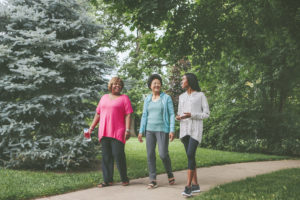
“Diabetes Alert Day is the perfect time to not only determine our own risk for prediabetes, but also encourage our family and friends to determine their chances of developing the disease,” said Crystal Hernandez, Program Manager for the YMCA’s Diabetes Prevention Program, Waco Family YMCA. “Studies show that people with prediabetes can prevent or delay the onset of type 2 diabetes by making simple lifestyle changes that include eating healthier and increasing physical activity.”
The YMCA of Central Texas is helping people potentially reduce the risk of developing prediabetes or type 2 diabetes by offering The YMCA’s Diabetes Prevention Program.
Some basic lifestyle changes that contribute to weight loss and an increased focus on healthy living can decrease the risk for type 2 diabetes. Among these are:
- Reduce portion sizes of the foods you eat that may be high in fat or calories.
- Keep a food diary to increase awareness of eating patterns and behaviors.
- Be moderately active at least 30 minutes per day five days a week.
- Choose water to drink instead of beverages with added sugar.
Incorporate more activity in your day, like taking the stairs or parking farther away from your destination.
Speak to your doctor about diabetes risk factors, especially if you have a family history of the disease or are overweight.
To learn more about the YMCA of Central Texas’s Diabetes Prevention Program, please visit ymcactx.org or contact Crystal Hernandez at 254-776-6612 or [email protected].
By Rae Jefferson
Family Health Center has a long history of working to serve the primary care needs of low-income and uninsured patients in the Waco area. With 14 clinics across McLennan County, FHC is constantly expanding and working to improve the scope and quality of care offered to patients. Here are five programs and strategies we use to offer the best medical, dental, and behavioral health care we can to our community.

1. We address social problems that negatively affect the mind and body. Social determinants of health are conditions within a home, school, workplace, and community that influence health risks and outcomes. According the U.S. Centers for Disease Control, “unstable housing, low income, unsafe neighborhoods, or substandard education” can have a negative effect on a person’s health, both physical and mental.
While addressing these health concerns is often complicated, FHC has implemented a few programs to help find solutions. Low literacy levels are shown to increase “adverse health outcomes, including increased mortality, hospitalization, and in some cases poorer control of chronic health conditions.” Reach Out and Read is a national program that supplies free books to FHC patients aged 6 months to 5 years. The program, currently sponsored by the Junior League of Waco, helps doctors and parents ensure young patients have tools to develop literacy skills that can improve health outcomes later in life. Books are available in both Spanish and English for all age levels.
Additionally, FHC has formed a Medical-Legal Partnership (MLP) with Greater Waco Legal Services, which helps medical providers understand and treat legal issues affecting the health of patients. The MLP allows medical professionals at FHC to refer patients to legal services, and for the legal team to have a physical presence in the medical clinic to consult with patients and providers about how to address health-harming legal needs. The partnership also educates medical staff on how to recognize health-harming legal needs during patient visits. Interactions between patients and medical staff or the legal team are confidential, and citizenship status is never shared with outside parties.
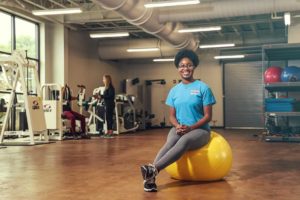
2. We offer unconventional approaches to managing health and promoting wellness. If you’re around FHC long enough, you’ll realize we care a lot about treating our patients in ways that will create lasting change in their lives. Through unique prescription programs, we give patients the tools to succeed in achieving a healthy and active lifestyle. Physicians can give patients a prescription for exercise, allowing them free access to the Wellness Center, located in our Madison Cooper Community Clinic. Fitness advisers work with each patient to evaluate exercise needs and abilities. Baylor University and individuals in the community have graciously donated all equipment in the workout facility.
Physicians also have the ability to give patients a Produce Prescription, which provides them with a free box of produce each week while the program is in season. Each box includes seasonal produce grown and provided by World Hunger Relief, Inc., as well as recipe cards to assist patients as they prepare meals.
3. We offer support groups that can improve health and well-being. Centering Pregnancy is a program that allows expectant mothers to find support and familiarity with one another. For some patients, familial support is limited or nonexistent. The groups allow them to find much needed community while decreasing chances of experiencing complications during pregnancy and delivery. Foster care groups are also available, and allow families with foster children to share their joys, challenges, and support for one another.

4. We are developing a greenspace in a Waco neighborhood. The Community Gathering Space is under development at our main clinic at Colcord Avenue and N 16th Street. In the future, the plot of land, adjacent to the Wellness Center, will be a greenspace with sitting areas and a walkway. It will also feature a small garden mirroring vegetables in the Produce Prescription boxes, which will allow patients to see the produce at all stages of growth and encourage a foray into home gardening. We broke ground in January and have already built a few raised garden beds and a portion of the walkway.
5. We bring behavioral health care into the exam room. Physicians in the U.S. often report that their patients do not have access to adequate mental health services. Furthermore, mental health diagnoses made by primary care doctors are often incorrect. Integrated Health Management is a method of treating patients that brings more accurate mental health care into exam rooms and gives them more time with a team of healthcare professionals. During routine visits, patients who would benefit can choose to see a mental health professional, also called an Integrated Health Manager, during the same visit to quickly receive a diagnosis and discuss treatment options. This process allows patients to more easily access mental health resources without sacrificing quality of care.

Rae Jefferson is a creative, Netflix binger, and marketing professional, in that order. Originally from Houston, she stuck around Waco after graduating from Baylor University with a B.A. in Journalism, PR, & New Media and a minor in Film & Digital Media. Now she’s the Communications Director at Family Health Center, where she gets to spend each day serving Waco. When she’s not working, find her at home snuggled up with her dog-daughter, Charlie, watching “The Office” for the hundredth time.
The Act Locally Waco blog publishes posts with a connection to these aspirations for Waco. If you are interested in writing for the Act Locally Waco Blog, please email a[email protected] for more information.
By Matthew Hoffman, MA, BCC
We began, about three years ago, the “Good Friends Volunteer Spiritual Care Program” out of a conviction that within our city, there is a “community of healers,” who if given proper training, in some very basic spiritual care and visitation ministry, under the help and guidance of our professionally trained Staff Chaplains, could come into the hospital context and make a difference in the lives of people in need.
Since we began this volunteer program, with now, visits numbering into the thousands, having taken place, this hypothesis has born itself out to be true, that there are everyday people, who can stand as “healers,” in sacred places, like that of a patient’s room, and by doing so, can make a profound, health giving difference in the trajectory of people’s lives.
Here in Waco, we are seeking to take the “Good Friends” program and pilot a new version of this to help mobilize volunteers from local bilingual/Spanish speaking congregations to the help advance the care of our Spanish only speaking patients. Coming into a hospital can be a very anxiety producing experience. How much more so if you speak a different language than the majority of your healthcare team? By being a member of the Good Friends program as a bilingual volunteer you will be a welcomed presence offering prayer as desired, a listening ear and making people aware of the other spiritual care resources that would be available to them.
- Through the Good Friend Program you will be trained in areas of:
- How to minister to the spiritual and emotional needs of the sick.
- Discover the unique nature of hospital ministry.
- How to care for people of diverse religious traditions and cultures.
- Being a ministry of presence
- The ministry of active listening
If you would like to be part of the Good Friends program as a bilingual volunteer, or if you just want to grow in your ability to care for sick within your own faith community (for pastors, who would like to send members to this training for added help in their congregation, please do so!), join us on Monday, March 25 from 1-430pm at the Allison Auditorium at Baylor Scott and White Health-Hillcrest Hospital. You can RSVP to Chaplain Matthew Hoffman @ [email protected]
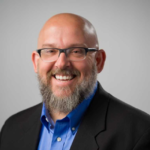
Chaplain Matthew Hoffman is a Board Certified Chaplain who serves at the system level as a Manager of Baylor Scott and White Health’s Faith In Action Initiatives (CTX). He oversees the development of various spiritual care programs in many of BSWH’s hospitals within its Central Division, as well as its local and international humanitarian aid and medical missions programs.
The Act Locally Waco blog publishes posts with a connection to these aspirations for Waco. If you are interested in writing for the Act Locally Waco Blog, please email [email protected] for more information.
By Craig Nash
When asked what her favorite part of the job is, Lakaisha Clark, the cafeteria manager at Parkdale Elementary School in Waco, gestures toward a room full of kids eating breakfast and replies, “This.”
“I don’t know what other people say about the kids here, but when I look out across this room, what I see are a lot of leaders,” she said. She loves speaking to kids individually and giving them encouragement to see in themselves what she sees in them.
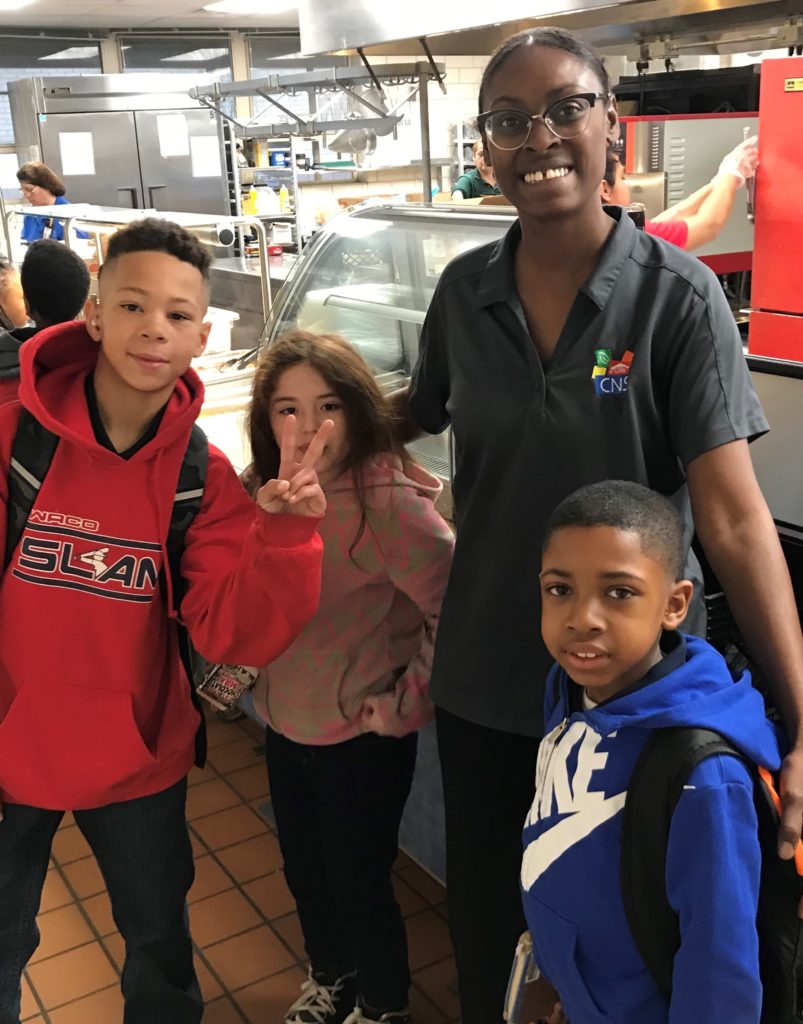
That ability to see the potential in others is likely one of the reasons she is in her current position. When this school year began, she was hired as a cafeteria worker at Parkdale. The management with WISD Child Nutrition Services quickly saw her leadership abilities and promoted her to Cafeteria Manager. The school has seen a drastic increase in both attendance and breakfast participation this year, which has had Clark overseeing a lot of changes in her cafeteria service. New workers have been added and physical changes to the building were made to accommodate an extra line for students to enter in.
She is at the school by 6:00 am and by the time she leaves around 3:00, has served Parkdale students over 450 breakfasts, 600 lunches, as well as afternoon snacks. All of this while managing a team of workers, placing and receiving orders, and tending to regulations associated with operating a USDA program. According to Assistant Principal Wendy Moulds, Ms. Clark does all of this with a smile on her face and an infectious, upbeat personality that lifts the spirits of students, faculty and staff.
At the Texas Hunger Initiative, we are convinced that addressing poverty and food insecurity requires a multi-pronged approach that includes policy makers, business, community leaders and non-profit organizations. But the foot soldiers on the front lines of ending childhood hunger are the Child Nutrition departments at our public schools. Food Service directors of these departments, like Cliff Reece at Waco ISD and Dave Thiel at La Vega ISD, oversee massive, complicated programs that have one goal in mind: To feed children. They are often the unsung heroes in our community, working behind the scenes to provide nutrition assistance to tens of thousands of kids in the Heart of Texas Region.
Usually food insecurity in families means that meals are spread thin, or difficult decisions have to be made about purchasing choices. But occasionally it means that school breakfast will be the first meal a child has eaten since they left school the previous day. Cafeteria Managers and food service workers like Lakaisha Clark recognize this, which gives them a sense of mission and intentionality about the work they do.
The first full week of March every year is National School Breakfast week, which is set aside to recognize the importance school breakfasts have in all of our communities. This week in the Heart of Texas, student athletes from Baylor visited campuses in Waco and La Vega ISD’s to celebrate the role Child Nutrition Departments play in the health and wellness of our kids. You should consider joining them in this celebration by taking some time this month to speak a word of encouragement to the Child Nutrition staffs of our local schools. Their work is done with great care and a deep love for the children in our communities.
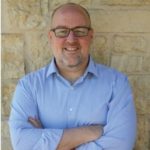
Craig Nash is the Regional Manager for Child Hunger Outreach at Baylor’s Texas Hunger Initiative. He enjoys talking and writing about Waco, Country Music, and Faith. He blogs at 17dutton.com.
The Act Locally Waco blog publishes posts with a connection to these aspirations for Waco. If you are interested in writing for the Act Locally Waco Blog, please email [email protected] for more information.

